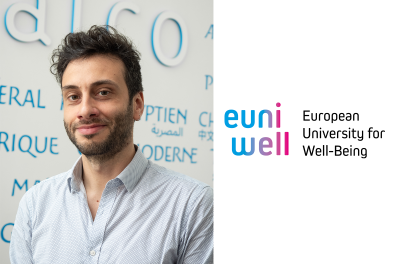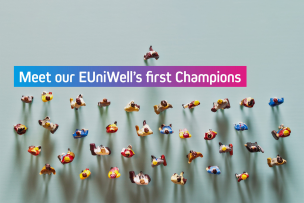Andreas Guidi selected among the first EUniWell champions

On this occasion, Andreas Guidi looks back on his academic and international career, while highlighting his pedagogical and scientific commitment to Inalco. As an EUniWell champion, he intends to show how history can shed light on contemporary debates on well-being, particularly through the study of migration in the Mediterranean.
Personal presentation
"I am a historian specializing in the Balkans and the Mediterranean in the 20th century. After completing my studies and postdoctoral experiences in Italy, Germany, France, and the United States, I joined Inalco in 2022. I am the author of the award-winning monograph Generations of Empire: Youth from Ottoman to Italian Rule in the Mediterranean (University of Toronto Press, 2022). I have published peer-reviewed articles in the Journal of Social History, the International Journal of Middle East Studies, and Revue d'histoire moderne et contemporaine, among others. At Inalco, I chair the M.A. programs in the department "Europe" and serve on the editorial board of Presses de l'nalco. Our department is a unique place covering Baltic, Central, Eastern and Southeastern Europe offering classes on 18 languages as well as humanities and social sciences courses.
I primarily teach the history of Southeastern Europe at the bachelor's and master's levels. Working with students from diverse backgrounds is an exciting challenge that inspires me to appreciate their multilingual abilities and adopt a pluralistic, critical approach to history. The Balkans are a region where different regimes have left a vivid heritage: the Byzantine and Ottoman empires, nation-states, state socialism, and military dictatorships. In my classes, I aim to foster students understanding of and critical thinking about the politics of the past as they resonate with the present.
I research the history of the Balkans and the Mediterranean, focusing on empires, fascism, and colonialism, as well as youth, generations, and migration. Currently, I am preparing a second monograph on these regions in the 20th century. It will highlight the interplay of post-WWII, the Cold War, and decolonization by focusing on different forms of illicit trade.
In addition to my international career, collaborating with colleagues abroad on projects and events has always been a priority for me. Since arriving at Inalco, I have been the principal investigator of two projects: one on the history of migration in the Aegean region with the University of California, Berkeley; and the other, a Villa Vigoni French-German-Italian conference series, on the history of Eurasian imperial borderlands.
I strongly believe that well-being requires a critical understanding of our past and present. Current environmental crises, social and economic inequality, attacks against democratic institutions, and intolerance can better be studied and addressed by centering the contributions of historians in public debates. For these reasons, I am thrilled to represent Inalco in the first cohort of EUniWell Champions and look forward to enriching conversations with our partner institutions!
